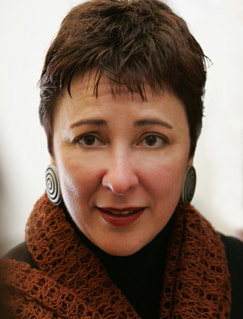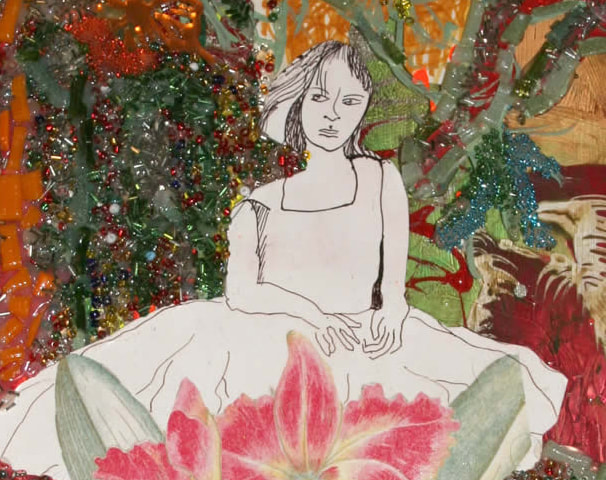Two Poems/Dos PoemasPor/By Carlota Caulfield Inner chamber of the seashell (divine whisper)And they will say: “A bit of smoke writhed in each drop of his blood.” -- Gilberto Owen It would seem that I possess a religious bent; a proof: a tongue sufficient It would seem that I possess a religious bent; to contain, direct, refined, and solid has led me to the five points of the universe: Quincunx. Four rooms courtyard that inclines its multiple forms that resides in matter that has vital layers ceremonial passageways of other architectures. Just as the divine spark engenders in the earth Guillermo Marín, Mitla, City of the Dead life in all its richness, thus the Quincunx, seed of a revealed cosmology, flowers in a dazzling system of images and architectural designs that, by being part of the universe of forms, suffers frequently from a deceptively elemental logic. What completes this text are monumental stones there where a hand learned how to move, sculpt and assemble. Eduardo's voice traces a map of Mexico on the earth while he tells of how “the colonial chroniclers never referred to the architecture of Mitla without combined aversion and admiration… Thus to speak of Mictlán (place of the dead) we must detach ourselves from the Western concept of death…” My absurd dizziness no longer rocks in the branches of the tule tree; now, in the land of the spirits, it is content with a puff of wind and a bold guffaw that perforates my eardrums. Yes, the church bells have begun to set loose a timely splendor and murmurs: Think of it this way, that amid the rubble of my energy suddenly looms a presence, like that of a hallowed place, door of musical allusions. I detach myself from the group. I am content to see. It matters. Several bolts of air swerve around my unfailing audacity and city of voices there where the wind does not sound unfamiliar to the ear nor is seeing spirits an act of inner shadows. What could be loved is erased and eyes and lips, light and humidity are stripped bare. The enigma of flavors is also resolved. The night before kisses Crossed two linguistic points. Now there is no dialogue. From the four cardinal points will soon rise a cold and ungenerous gust of wind. You will dissolve. My death is associated with the earth, but the other dead man in question will have to cross a long and mighty river. Techichi the little dog will guide him: naked he will cross spiky peaks and drink terrible storms. The wind will slice his skin like an orange. More than any heartbreak, worse than death Albius Tibullus, Book I, Poem VIII itself, “What hurts is touching the body, long kisses, and pressing thigh to thigh.” With transfigured vision, Friar Bernardo of Alburquerque ordered built between 1535 and 1580 the façade of the north side of the Oaxaca cathedral in the image… From the four room courtyard flow moving friezes of water. I read: the gods' anger with those who are ungenerous in spirit was not placated by sacrifices of armadillos, rabbits, birds and deer. Misers were condemned to a subterranean palace to hoist dark shadows. Once again Eduardo's voice blends with my mental torrent that encircles the marvelous mountains, copulates with the stone And drinks milk droplets from the tree that used to nourish dead children. Inhabitants of the clouds. Branches from which I hang. Schumann lieder that fuse with my own visions. Copious tongues of rock: to listen, to recognize, to descend to the interior of a jacaranda: to design the interior patio “was to get back onto the trail of my poem Propertius, Book I, Poem IV after biting my hands unreasonably and stamping my feet in doubt and anger.” Some elegiac distiches pound me with excessive skill. What am I doing in the center of the city of the dead humming a thousand popular tunes and with all those poems breaking over me? What is my skin doing turned into a spongy substance enjoying each voicemark and stroke, each perforation, each drop of blood that seeps from my pores? Blessed recollection, there where a scornful grimace offers me landscapes. Blessed misery of broken borders that turns the heart into a semi prophet. that “das harts iz a halber novi” that is completed and heard by a system of images: it hits and turns with skill for I was born in a city by the sea with excessively white sands and I never made a pact with its hot winds or its salts projected in my shadows. If the sea breeze took my breath away, I drowned and was resuscitated. And my mother who couldn't hear the voices that filled the whole house and went with me, spoke alone with nanny Blasa. Later they put an amulet on my chest, There where no one could see presences or memories. I think only of all the courage I've lacked to go back to hearing the voices, raised now, loud, without any semblance of restraint, flowery battle of my own soul. POEMA BILINGÜE/BILINGUAL POEMFrom Quincunce / Quincunx. Translated by Mary G. Berg and Carlota Caulfield. Estudio cromáticoTe gustaría lentamente tatuarte con las notas del trombón. Decir, no tengo más que esto, lo que abre la epidermis y hace brotar sangre, lo que queda cuando la muerte lo arrasa todo, menos los sonidos del cuerpo. Y así las uñas guardarán su color rosáceo, los senos su firmeza, el cuello su tersidad. Reconocerás el privilegio enorme que se aloja en las venas y podrás descender a un centro de quietud sin aferrarte a nada. Entonces la respiración empezará una vez más, y con ella una salivación anfibia repugnante hasta que tu mano se mueva con rapidez y el sudor pierda su pestilencia. Pero no sufrirás vértigo. La avalancha caerá sobre ti como bendición. Tu boca vibrará y escupirá hilos imperceptibles. Después llegará el viento loco y comenzará el concierto. Chromatic Study You'd like to tattoo yourself slowly with the trombone's notes. Saying: I only have this, this that rips my skin open and makes blood gush out, this that remains when death wipes out everything, except the sounds of the body. And thus fingernails will keep their rosy hue, breasts stay firm, neck smooth. You will recognize the enormous privilege lodged in your veins and be able to descend to a center of quietude, breaking all ties. Then breathing will begin yet again, and with it, a repugnant amphibious salivation until your hand moves rapidly and sweat loses its pestilence. But you will not suffer from vertigo. The avalanche will sweep over you in benediction. Your mouth will vibrate and spit out imperceptible threads. Later the mad wind will blow and the concert will begin.  Carlota Caulfield, a poet, writer, translator and literary critic, has published extensively in English and Spanish in the United States, Latin America and Europe. Her most recent poetry books are JJ/CC and Cuaderno Neumeister / The Neumeister Notebook. The recipient of several awards, Caulfield is the W. M. Keck Professor in Creative Writing and head of the Spanish and Latin American Studies Program at Mills College, Oakland, California. Her webpage is www.carlotacaulfield.org. Mary G. Berg, a Resident Scholar at the Women’s Studies Research Center at Brandeis University, Boston, Massachusetts, has translated poetry by Juan Ramón Jiménez, Clara Roderos, Marjorie Agosín and Carlota Caulfield and novels by Martha Rivera (I’ve Forgotten Your Name), Laura Riesco (Ximena at the Crossroads), Libertad Demitropulos (River of Sorrows). Her most recent translations are of collections of stories by Olga Orozco and Laidi Fernández de Juan.
0 Comments
Your comment will be posted after it is approved.
Leave a Reply. |
Archives
July 2024
Categories
All
|
Donate and Make Literature Happen
is published by the Somos En Escrito Literary Foundation,
a 501 (c) (3) non-profit, tax-exempt corporation. EIN 81-3162209



 RSS Feed
RSS Feed